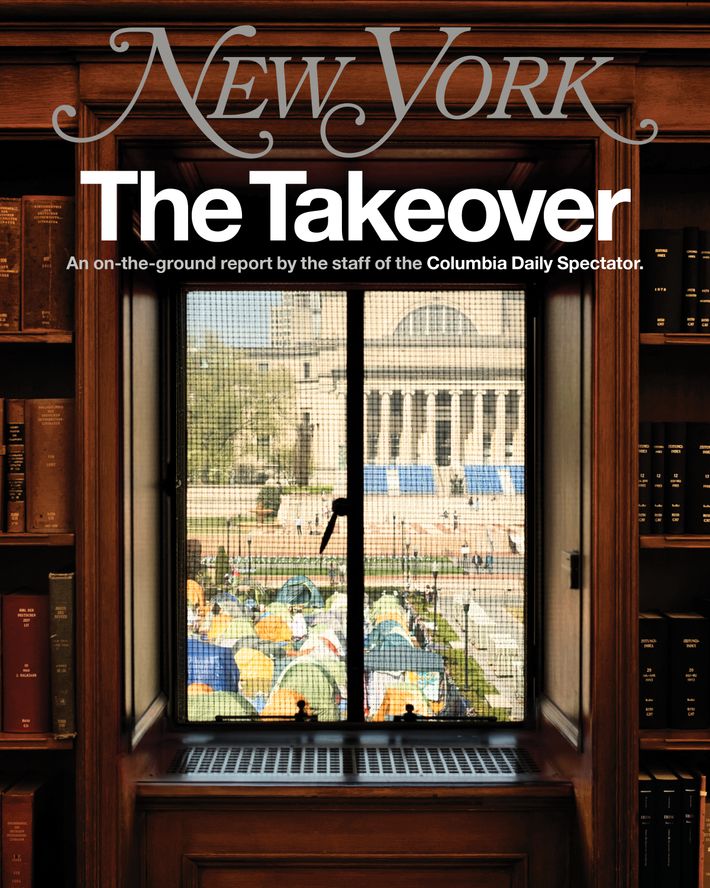1.
“The Takeover,” May 6–19
For New York’s latest issue, the magazine asked the student journalists at the Columbia Daily Spectator, the university’s independent undergraduate newspaper, to report on the pro-Palestinian protests that divided their campus and then spread to colleges across the country. “Just genius in assignment editing,” said Josh Marshall of Talking Points Memo. The television host Alejandra Ramos added, “Such an incredible show of journalistic respect and solidarity.” The package was written and photographed by Spectator staffers, including the cover image, which was shot by freshman Stella Ragas. “See what’s possible when you treat student journalists as professionals rather than sources?” tweeted Joshua Hunt. “A magazine cover for the ages.” In his newsletter for CNN, Oliver Darcy wrote, “The protesting students who wanted to speak to the media were far more likely to trust their fellow classmates than the hordes of reporters from national and international news organizations who had descended on the campus.” “We have a stake in our community,” Spectator editor-in-chief Isabella Ramírez told CBS News. “We know our peers. Many of the people involved — on all angles — are friends of ours, classmates, people we know really well. That’s crucial to the community we build in our reporting and the connections we have with our sources.” The report from the students opened with an oral history of the protests (“Our Campus. Our Crisis”). Film producer Heidi Reinberg wrote, “I curtailed my dog’s a.m. walk to get back to reading #TheTakeover — a riveting piece of journalism,” while the ACLU’s Allegra Harpootlian said it “should be required reading.” The package included a poll of 719 students, faculty, and others at the university (“So What Does Everyone Else on Campus Think?”). “I do wonder how much polling students about how safe they *feel* is informative,” Tim_nich wrote on Instagram, referring to a finding that only 41 percent of respondents said they felt safe on campus. “People’s perception of safety isn’t always reflective of reality, and claims of feeling unsafe are easily weaponized to shut down others’ speech or even justify state or vigilante violence against people one deems ‘threatening.’ ” Columbia employee Joe Nord wrote, “How about the senior year of some students? Their final days on campus are now colored by invasive protests.” Reflecting on the issue, commenter newcavendish observed, “I am struck that both sides in this drama seem to be living in their own fantasy versions: the demonstrators have a romantic fantasy of ‘resistance’ detached from any practical goals and from supporting the oppressed Palestinians. The pro-Israelis are indulging in a dystopian fantasy of antisemitism … Rather than repeating the same allegations over and over as slings and arrows against each other, they should be trying to figure out how to propose a pragmatic solution on the ground.”
2.
“The Last Thing My Mother Wanted”
In the same issue, writing under the pseudonym Evelyn Jouvenet, a woman chronicled her traumatic upbringing and her mother’s recent decision to end her life through assisted suicide. Journalist Zoë Grünewald wrote, “This is a truly beautiful and tragic piece, well worth your time.” sfreader said, “I’m grateful to the author for her writing and her compassion, both of which are extraordinary,” while lmmac found that “every time I started to get used to a direction the writing was taking me, she managed to shift the ground and take the description of grief and love and anger and acceptance to a new level.” Commenter nmcb3299 proposed, “If I was very sick but still felt perfectly healthy, I think I would put off ending my life and travel on my bucket list trip to all the most dangerous parts of the world … I’d go out for dinner and try that poisonous fish sushi that can kill you if it is not prepared properly.” Emma Wynne called the essay “a good reminder never to judge people who have difficult relationships with their parents, or who cut off contact altogether.” And commenter hello said, “Fellow daughter of a BPD mother here. This article made me cry. The author’s mother’s final selfish act of revenge against her daughters was to force them to watch her kill herself. No doubt this whole affair was a ‘test’ for them to prove how much they loved her. My mother used to threaten suicide starting when I was in elementary school, to test us to see how much we cared. Didn’t object enough? We didn’t love her and were rotten children … It sounds like the author and her sister have broken the cycle. I’m glad they have each other.”
Send correspondence to comments@nymag.com. Or go to nymag.com to respond to individual stories.
